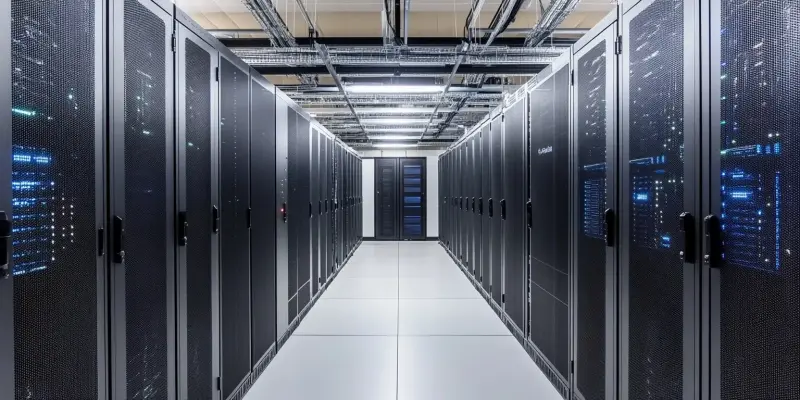In the rapidly evolving ecosystem of digital infrastructure, advancements in AI and innovative data center technologies are playing a transformative role. These developments are crucial in enhancing the capabilities and efficiency of modern technology and business environments. One key player steering this transformation is Nadia Partners, which has initiated Beacon AI Centers dedicated to developing advanced AI data centers in Alberta. These centers aim to bolster the region’s AI prowess, providing a robust framework for handling the increasing demand for sophisticated AI solutions. As digital landscapes grow more intricate, the importance of resilient and intelligent infrastructure becomes paramount, ensuring seamless and efficient operation of critical applications.
Another significant contributor to this advancement is Vertiv, headquartered in Westerville, Ohio. Vertiv excels in providing an extensive array of hardware, software, analytics, and ongoing services that enable essential business applications to run consistently and scale alongside organizational growth. Operating in over 130 countries, Vertiv addresses the critical challenges of data centers, communication networks, and industrial facilities. The company’s diverse portfolio underscores its commitment to facilitating the continuous evolution of digital infrastructure, ensuring it remains robust against the increasing complexities of the technology landscape. The synergy between AI advancements and data center capabilities highlights a coordinated effort to meet modern digital demands.
Emerging Leaders in Data Infrastructure
Stelia, a next-generation Internet carrier, is revolutionizing the digital domain with its innovative elastic connectivity platform. This technology is designed to support the emerging workloads of the modern Internet, addressing critical needs for high-capacity, wide-area networking. Stelia’s platform plays a pivotal role in facilitating a new distributed data architecture, which is essential for the real-time, data-intensive demands prevalent in today’s digital economy. By enhancing connectivity and ensuring robust network infrastructure, Stelia is spearheading the movement towards more dynamic and flexible digital environments. The company’s focus on meeting modern Internet demands underscores the industry’s shift towards scalable and adaptive solutions.
Meanwhile, VIRTUS Data Centers, part of the ST Telemedia Global Data Centers Group, is establishing itself as a global leader, particularly within the UK. With operations spanning multiple countries, VIRTUS continues to provide reliable, resilient, and responsible digital infrastructure. Its decade-long track record of running highly efficient facilities highlights its dedication to operational excellence. Prioritizing safety, security, and continuous availability, VIRTUS ensures the smooth operation of critical data services. This commitment is crucial for maintaining the integrity and reliability of the digital infrastructure, which supports various sectors and industries worldwide.
Innovations in Cooling Solutions
Accelsius is at the forefront of enabling mission-critical data centers to achieve their business, financial, and sustainability objectives. Recognized for its NeuCool™ platform, Accelsius offers next-generation cooling solutions featuring direct-to-chip, two-phase cooling technology. This innovative system uses a sustainable dielectric fluid coupled with intelligent monitoring to provide scalable, risk-free cooling. Such advancements are essential as they directly impact the efficiency and reliability of data centers, ensuring they can handle the ever-growing data loads while maintaining sustainable practices. The use of cutting-edge cooling technologies exemplifies the continuous pursuit of operational excellence within digital infrastructure.
The overarching themes evident across these advancements underline a focused move towards scalable, efficient, and intelligent infrastructure solutions designed to support the burgeoning data-intensive needs of the digital economy. Companies like Nadia Partners, Vertiv, Stelia, VIRTUS Data Centers, and Accelsius exemplify this transformative journey, each contributing unique solutions that enhance reliability, efficiency, and sustainability. As the digital economy expands, the emphasis on developing robust and forward-thinking infrastructure becomes increasingly essential. The collective efforts of these leading entities reflect an era of technological innovation poised to propel digital infrastructure to new heights, ensuring it remains adaptive and resilient against future challenges.
Conclusion
In the rapidly changing digital infrastructure landscape, advancements in AI and innovative data center technologies are crucial. These innovations enhance the capabilities and efficiency of modern technology and business environments. One notable contributor is Nadia Partners, which has launched Beacon AI Centers to develop advanced AI data centers in Alberta. These centers aim to elevate the region’s AI capabilities, providing a strong foundation for managing the growing demand for sophisticated AI solutions. As digital environments become more complex, the need for resilient and intelligent infrastructure is essential for seamless and efficient operation of critical applications.
Another major player in this space is Vertiv, based in Westerville, Ohio. Vertiv provides a wide range of hardware, software, analytics, and ongoing services to ensure essential business applications run smoothly and can scale with organizational growth. Operating in over 130 countries, Vertiv tackles the critical challenges faced by data centers, communication networks, and industrial facilities. Their diverse portfolio demonstrates a commitment to evolving digital infrastructure, keeping it robust against increasing technological complexities. The synergy between AI advancements and data center capabilities highlights a unified effort to address modern digital demands.

